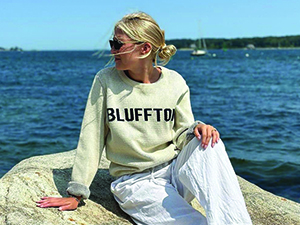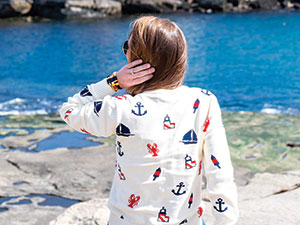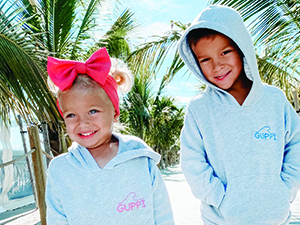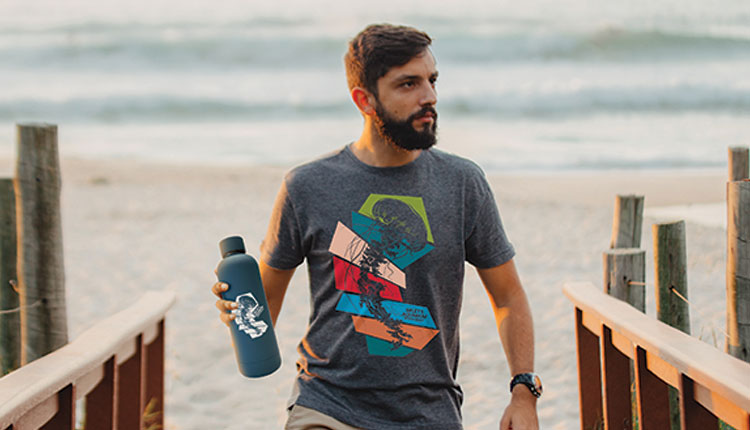From eco-friendly printing processes to sustainable fabrics, eco-conscious apparel brands are giving customers a way to fashionably support ocean-saving efforts.
For many seaside enthusiasts, embracing the beach lifestyle means more than soaking up sun and surf. It is also about making choices with the brands they support with their dollars.
Knowing that a garment is sustainably produced and how it is protecting the environment has an influence. As a seaside retailer, you have the opportunity to give consumers what they want as many apparel brands offer sustainable options.
Friendly fabricsFounded in 2019, Guppi is a brand with a passion for the sea whose products are made from recycled plastic. The woman-owned business, which sells its products through wholesale, e-commerce and a brick-and-mortar store in Wildwood, New Jersey, is known for its super-soft clothing.
“Everything we make and sell is eco-friendly,” says Abby MacQueen, owner of Guppi. “All of our apparel is made with a variety of sustainable materials. Recycled plastics, recycled cotton, organic cotton, bamboo, hemp and modal are some of the materials we use.”
 Town Pride proudly makes its sweaters, knit shirts and children’s knit sets in the USA using energy-efficient processes. The company also uses recycled plastic threads for its embroidery and water-based inks for its screen prints.
Guppi also carries other eco- friendly brands in its shop, like Timber Surf Boards made from cork, reclaimed wood skateboards from a local artist, Backyard Bar Man, Organic Surf Wax and many new arrivals that came earlier this year, according to MacQueen.
“Our ocean is our focus. It is what drives people to vacation in the place we get to call ‘home,’” she says.
“Sustainability isn’t a ‘trend.’ It’s a lifestyle change that people want to learn and focus on. Small changes make a big impact, and visitors want to find little ways they can help preserve and improve the place they look forward to visiting year after year.”
Nicole Recomendes, the owner and designer of Allison Cole Jewelry, is getting on board with the sustainability trend with the launch of a new eco-friendly clothing brand.
SeaBird Clothing is a recycled sweater line inspired by Recomendes’ love of New England. Each sweater is manufactured using 50% recycled materials from textile remnants.
“In creating my own clothing line, it was important to me to limit the environmental impact of the product that I am bringing into the world. Using recycled yarn was one way that I could do that while still creating a high-quality garment,” she says.
Recomendes says today’s customer is growing increasingly conscious of where their clothing is coming from.
“Knowing that a product they love is eco-conscious or sustainably sourced will impact their decision to purchase and can be a great selling point for the retailer.”
SeaBird Clothing designs feature a variety of New England themes, such as anchors, nautical flags and lobsters. The new line is available at www.seabirdclothing.com.
Purposeful printingAnother way clothing can be more sustainable is with the printing and decoration processes. Michael Atkinson, CEO of A&F Souvenir, says, “We are working hard to improve the sustainable nature of our apparel offerings.”
 The new SeaBird Clothing line features iconic New England symbols and are manufactured from recycled yarn. He says the company’s direct-to-garment printing method is one of the most sustainable decoration methods as it uses 90% less water, 60% less energy and generates much less chemical waste than traditional printing methods.
Atkinson notes that direct-to-garment printing has been a game changer for A&F Souvenir in reducing the company’s carbon footprint, water waste and overall energy consumption. The method also has the added benefit of providing incredible full color graphics. He adds, “No longer do we need to sacrifice quality in order to deliver a more sustainable garment.”
“We all play an important role in reducing single-use plastics. One focus of our company is to reduce and eliminate plastic packaging waste from our manufacturing process where possible,” Atkinson says. “This includes how the products ship from our suppliers to us, as well as how we ship the products to our customers.”
He adds, “We feel that the impact of reducing plastic waste in our industry is important and relatively easy for most suppliers. They just need to conscientiously make it a focus. This is what we are doing at A&F Souvenir.”
Town Pride’s sweaters, knit shirts and children’s knit sets are crafted through an energy-efficient process that minimizes waste and is entirely chemical-free.
Composed of upcycled plastic bottles and cotton fabric scraps, the yarn is used to make stylish apparel and accessories.
Town Pride President Tamara Moran says the company is trying to raise awareness about the United Nations’ 17 Sustainable Development Goals (SDGs), which are an urgent call for action by all countries, developed and developing, in a global partnership. The United Nation’s SDGs recognize that ending poverty and other deprivations must go hand-in-hand with strategies that improve health and education, reduce inequality and spur economic growth — all while tackling climate change and working to preserve our oceans and forests.
“The health of our planet is important to us,” Moran says, adding that the response by customers has been overwhelming.
Town Pride’s products are also made in the USA. Additionally, a portion of the company’s proceeds are donated to organizations that support ending food insecurity, homelessness and a cleaner planet.
“Each sweater, blanket, pillow, accessory tells a story of dedication to the craftsmanship and respect for the environment, making it not just a garment but a symbol of conscious consumerism and timeless style,” Moran adds.
Start ’em youngAnd eco-friendly apparel wearers come in all ages. Even very young customers have options when it comes to clothing that is good for the planet. Me O My Earth is an eco-friendly clothing brand specializing in infant/toddler footies, bodysuits, pants, blankets and two-piece pajama sets. The company is also expanding into plush.
 Super-soft and sustainable are the signature characteristics of Guppi brand clothing, with a retail store based in Wildwood, New Jersey, plus wholesale and e-commerce divisions. “My partner and I have quite a bit of experience in the infant apparel industry and wanted to create a brand that we feel good about as we both are moms too,” says Carolyn Eichelman, owner of Me O My Earth. “We are a women-owned company as well.”
Me O My Earth’s footies, coveralls, pajamas and pants are made from a proprietary blend of organic cotton/polyester made from recycled bottles and spandex. Each footie repurposes three plastic bottles. Its bodysuits are made from 100% cotton, made in the U.S. and designed/printed locally thus lowering their carbon footprint.
Me O My Earth’s collections focus on endangered species, and it gives back to organizations that support them in the wild.
“Last year we participated in the Billion Baby Turtles program with seeturtles.org and gave a portion of our sales to their organization,” says Eichelman. “We believe that sustainability is becoming more and more important for families, especially those with babies to think forward as to what the world will look like for their children.”
Eichelman adds, “Sometimes just one small change can add up quickly and buying eco-friendly products is a great start.”
Simply Chickie’s clothing for babies, toddlers and adults are Global Organic Textile Standard certified, which is the worldwide textile processing standard for organic fibers. Gwendolyn Gardner, president aka “the chief chick” of Simply Chickie, created the brand in 2005 after a major life event — she was diagnosed with breast cancer. That same week, she learned she was pregnant.
“This juxtaposition was confusing yet transforming. I started thinking about what I put in my body and what I put on it,” she says.
After recovery, Gardner began her transformation. “I ate organically grown fruits and vegetables, practiced yoga, paid close attention to labels and discovered that the soft cotton clothing I enjoyed hid a dirty secret.
The cotton crop is one of the most polluting crops grown. I was going to do everything in my power to ensure my little girl was as safe as she could be — and the idea of Simply Chickie was born.”
Gardner says when she started the business, she had to educate everyone on what organic cotton is. Today it’s a different story.
“The younger generation who came of age with more focus on the environment is now demanding that their parents gift them with organic products at their baby showers as one example,” she says.
Items featuring coastal designs with accompanying phrases like Beach Bum and Local Catch add fun into the mix.
As for trends, Gardner says she has noticed a greater focus on organic materials, sustainable fashion, removal of waste and people willing to change their patterns to support brands that pay attention to the environment.
Taking actionSaving the planet and the preservation of waterways and beaches cannot happen without cooperation and collaboration, and retailers can make a difference in this area.
“Many retailers have developed green initiatives to ensure national parks, cultural attractions, and zoos and aquariums are doing their part to practice sustainability,” Atkinson shares. “We will also continue our eco-friendly focus, and hope that retailers will make conscious choices to buy eco-friendly offerings, and consider the product makeup, production methods and packaging choices.”
Atkinson concludes, “If we all do our part, then clean tourist destinations will be available for many future generations.”
|




